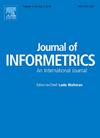科学期刊被引速度评估:基于生存分析的方法
IF 3.5
2区 管理学
Q2 COMPUTER SCIENCE, INTERDISCIPLINARY APPLICATIONS
引用次数: 0
摘要
这项研究解决了理解科学论文获得引用的速度有多快的需求。生存分析用于模拟论文收到第一次引用之前的时间。利用Kaplan-Meier估计器和离散时间模型,该研究评估了随时间变化的被引可能性,并分析了影响被引速度的因素,重点关注合著者数量、期刊影响因子和被引参考文献数量。该方法应用于信息科学领域的一组顶级期刊。由Web of Science定义的图书馆学学科类别。主要研究结果显示,不同期刊之间的被引率存在显著差异,特定来源的被引率更高。通过对引用速度进行建模,该研究为知情期刊选择提供了数据驱动的基础,旨在最大限度地提高早期学术认可。它为作者通过战略性期刊选择寻求及时的科学评价提供了一个实用的、基于经验的决策支持框架。本文章由计算机程序翻译,如有差异,请以英文原文为准。
Evaluating the speed of citation in scientific journals: A survival analysis-based approach
This research addresses the need to understand how quickly scientific papers gain citations. Survival analysis is employed to model the time until papers receive their first citation. Leveraging the Kaplan-Meier estimator and the discrete-time model, the study evaluates the likelihood of citation over time and analyses factors influencing citation speed, focusing on the number of coauthors, the journal's impact factor, and the number of cited references. The approach is applied to a set of top journals in the Information Science & Library Science subject category defined by Web of Science. The main findings reveal notable differences in the citation probability between different journals, with specific sources exhibiting faster citation rates. By modelling citation speed, the study offers a data-driven basis for informed journal selection, aimed at maximising early scholarly recognition. It provides a practical, empirically grounded decision-support framework for authors seeking timely scientific appraisal through strategic journal selection.
求助全文
通过发布文献求助,成功后即可免费获取论文全文。
去求助
来源期刊

Journal of Informetrics
Social Sciences-Library and Information Sciences
CiteScore
6.40
自引率
16.20%
发文量
95
期刊介绍:
Journal of Informetrics (JOI) publishes rigorous high-quality research on quantitative aspects of information science. The main focus of the journal is on topics in bibliometrics, scientometrics, webometrics, patentometrics, altmetrics and research evaluation. Contributions studying informetric problems using methods from other quantitative fields, such as mathematics, statistics, computer science, economics and econometrics, and network science, are especially encouraged. JOI publishes both theoretical and empirical work. In general, case studies, for instance a bibliometric analysis focusing on a specific research field or a specific country, are not considered suitable for publication in JOI, unless they contain innovative methodological elements.
 求助内容:
求助内容: 应助结果提醒方式:
应助结果提醒方式:


